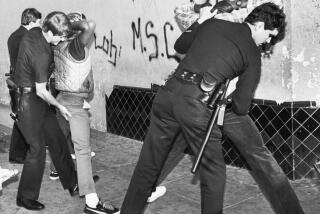Newton: Free speech and L.A. County’s supervisors
The Los Angeles County Board of Supervisors oversees a vast operation: It incarcerates thousands of inmates; it cares for children whose parents have abused or neglected them; it runs hospitals, clinics, beaches, harbors, parks and a welfare system. So it’s no surprise that the board’s meetings draw animated commentary. What is surprising is what those commenters want to talk about.
At a recent meeting of the board, the first member of the public to comment was Eric Preven, who calls himself “The County Resident from District 3.” He used his allotted time to raise questions about the county’s legal bills and to complain that a report about those bills had been delayed. He went over his time limit, but he had some points to make, and Supervisor Zev Yaroslavsky, who chaired the meeting, let him finish.
Next up was a resident in a glittery cap who fulminated about sheriff’s deputies she wanted to have deported; she concluded by proclaiming that the U.S. Department of Homeland Securitywas run by Mexican drug cartels. Another speaker took issue with Supervisor Gloria Molina for ignoring her presentation and grumbled: “Supervisor Molina has been rather busy having a party.” And Arnold Sachs, a perennial at these sessions, pulled several items from the agenda on which to comment. I’d report what he said, but to be honest, I couldn’t figure it out.
That’s just a snapshot. One regular commentator often warns of approaching Armageddon and the special toll it will take on Westside Jews; another insists a local judge is the father of her child.
The supervisors don’t make much of an effort to hide their lack of interest in such diatribes. At one meeting I attended recently, Supervisor Mark Ridley-Thomastalked with staff during the public comments, Molina chatted with Chief Executive Officer William T Fujioka, and Supervisor Michael D. Antonovich loudly crunched his way through an afternoon snack. Only Yaroslavsky and Supervisor Don Knabe appeared to be paying any attention at all.
All of which raises the question: What’s the point? Is all this public comment a noble exercise in free speech and participatory democracy? Or is it just a big waste of time? The answer is both, and that’s caused a minor flare-up over at the county Hall of Administration.
Frustrated by speakers who try to commandeer the podium by signing up to speak on item after item, Yaroslavsky, at the suggestion of county counsel, has called for trimming the amount of time given to each speaker.
That hardly seems an assault on the 1st Amendment — California law gives the chair discretion in doling out time — but the county’s regular guests see it as an attempt to muzzle them and shield the board from their withering broadsides. They have managed to enlist the support of open-government groups, one of which accused the board of “disrespect for public involvement.”
All of this — and particularly the coverage of it by The Times — has exasperated Yaroslavsky, who’s not accustomed to being accused of shutting out the public. He insists he’s just trying to run an orderly meeting. “It’s become a spectacle,” he said, adding that this isn’t about saving time for the board but rather for others who attend. “The board’s going to be there until 5 o’clock anyway.”
Under the county counsel proposal that Yaroslavsky has introduced, instead of having two minutes to comment per agenda item, speakers would get a total of three minutes for all the agenda items they want to comment on. Those wishing to address something not on the agenda would get two minutes to do so at the end of the meeting.
That’s something less than cutting off all commentary, and really wouldn’t change much at all. As Yaroslavsky said, “If someone wants to call me a bozo, they can do it in two minutes just as easily as three.”
One point his critics make is that board members themselves waste a fair amount of time on unimportant matters too. There are the ritual adjournments in memory of this person or that, the presentations of awards, Antonovich’s weekly pet adoption moment. If Yaroslavsky is so worried about wasting time, they wonder, why doesn’t he eliminate some of the supervisorial rambling?
Yaroslavsky concedes that the supervisors fritter away meeting time, but he also defends some of those practices: “When we honor the deputy sheriff who caught the arsonist, that’s public business.” As for the rest, “We’re just trying to manage decorum.” And for that, he sighed, “I’m being accused of channeling my czarist ancestors.”
Jim Newton’s column appears Mondays. His latest book is “Eisenhower: The White House Years.” Reach him at jim.newton@latimes.com or follow him on Twitter: @newton_jim.
More to Read
A cure for the common opinion
Get thought-provoking perspectives with our weekly newsletter.
You may occasionally receive promotional content from the Los Angeles Times.







